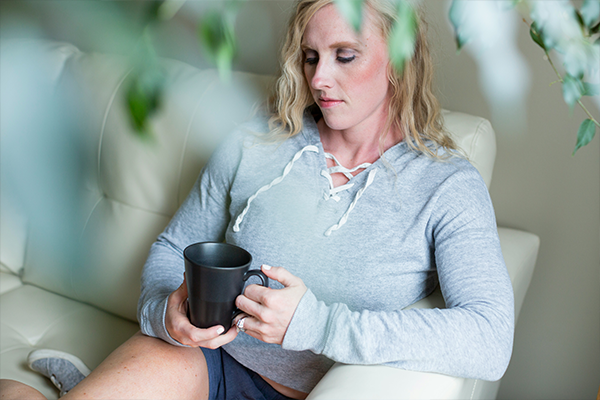15% off £25 or 20% off £35
Code:BASKET
From hot flushes to brain fog: understanding menopause symptoms

Menopause doesn’t come with a manual. One day it’s barely noticeable, the next it feels like a full-on body takeover. Here’s your expert-backed guide to the symptoms, why they happen, and how to feel
Summary
1Common symptoms of menopause
No two menopause journeys are the same. The hormonal changes you experience during this time can affect you physically, emotionally, mentally and…
2Symptoms of early menopause
The signs and symptoms of early menopause are the same as those of perimenopause and menopause…
3How long do the symptoms of menopause last?
Every woman’s experience with menopause is different. There are no hard and fast rules – you may only have a few symptoms, or you may experience…
Everyone experiences menopause (12 months without a period) differently.1
But whether your symptoms are mild or intense, few or many, and start earlier or later (usually any time between the ages of 45 and 55, but it can happen before then), they can have a big effect on your everyday life.1,2
“Menopause itself happens to all women. However, the journey leading to it (the “perimenopause”, which can start up to 10 years before) and the experience of the menopause and after the last period really is unique to each and every one of them,” begins Dr Shazia Malik, consultant obstetrician and gynaecologist.
“Whilst you may have some knowledge of it from your own mum or friends and relatives, there are so many factors that can affect how you feel or how your hormonal fluctuations can affect different bodily functions and symptoms, that it’s important not to contrast or compare.”
If you’re looking to learn more about menopause symptoms before they happen or think you’re already navigating them, we’re here to help you feel seen, supported and confident.
Common symptoms of menopause
No two menopause journeys are the same. The hormonal changes you experience during this time can affect you physically, emotionally, mentally and even socially.1
While some women will breeze through with only a few mild symptoms, others may experience a whole host of life-disrupting changes that can last between a few months or persist for years.1

The one defining sign of menopause? Going 12 months without a period – including any spotting.3
It’s important to remember that while the following are common menopause symptoms, you may experience none, some or all of them – and at varying degrees of intensity.3-5
Physical symptoms of menopause
- hot flushes: also called hot flashes, they’re the most common menopause symptom. They feel like a sudden surge of heat across your face, chest and upper body, often leaving you red and sweaty. Some women find that a hot flush will be followed by a cold chill3,6
- night sweats: these are hot flushes that strike while you’re asleep. You may wake up feeling overheated, flustered and drenched in sweat3,6
- vaginal problems: falling oestrogen levels during menopause can cause unpleasant symptoms down below, like vaginal dryness, itching, discomfort and pain during sex.3,5-7 “Symptoms of prolapse can also become more marked after the menopause,” adds Dr Malik
- urinary problems: a drop in oestrogen may also lead to a more frequent or urgent need to pee, and you may experience recurrent urinary tract infections (UTIs) 5,6
- painful intercourse: low oestrogen can make the vaginal tissues drier and more sensitive, causing pain during sex4-6
- palpitations: it’s not clear what causes it, but many women experience the feeling of a racing heart during menopause2,5-8
- migraines: it’s thought that shifting oestrogen levels can trigger migraines – and if you’re prone to them, you might find they get better or worse6,9,10
- joint and muscle pain: fluctuating oestrogen levels can affect how your body processes pain, which could explain why women report more aches and pains during menopause11
- skin and hair changes: as oestrogen levels drop, your skin may feel drier and itchier. You may also notice new hair growth on your chin and jawline and thinning hair on your head7,12
- body shape changes: weight gain affects at least 50% of women during menopause, often gathering around the tummy and upper body. Shifting oestrogen and progesterone levels can also lead to fluid retention and bloating, changing your body shape13,14
- burning mouth: some women experience a burning, tender, tingling, hot, scalding and numb sensation in their mouth – thought to be down to hormonal changes15
- changes in taste: another symptom reported by lots of people during and after menopause. You might notice foods tasting stronger, weaker or just different, thanks to fluctuating oestrogen levels16
- digestive issues: some women notice more digestive issues 17
If you’re experiencing these symptoms but aren’t sure they’re down to menopause, it’s a good idea to check in with your GP for peace of mind.
Mental and emotional symptoms of menopause
- memory problems: as many as two-thirds of women experience forgetfulness or trouble focusing during menopause. While ‘brain fog’ is completely normal, it can feel distressing – especially if it affects your confidence at work or in social situations4,6,7
- mood changes: hormonal changes can leave you feeling more irritable, teary or experiencing low mood 4,6,7
- depression and anxiety: your risk of depression and anxiety is higher around menopause. It’s not exactly clear why, but it may be due to hormonal changes, lack of sleep or a mix of both
- problems sleeping and fatigue: night sweats are a common culprit behind disrupted sleep during menopause, but low mood, depression and anxiety can also take a toll on your sleep quality. Poor sleep can, in turn, worsen other symptoms, like increased irritability or trouble concentrating 5,6
- less interest in sex: while some women’s libidos are unaffected, the combination of declining oestrogen and testosterone levels, uncomfortable vaginal symptoms and simply not feeling quite like yourself can result in a reduced sex drive 4-6
- low self-esteem and embarrassment: experiencing symptoms that are noticeable to others, like poor memory, concentration struggles or hot flushes, might make you feel uncomfortable in professional or social situations 6,7
“Changing personal relationships and circumstances are common in midlife, too – children leaving home or moving back in, elderly parents, job changes… These can all exacerbate other symptoms of the menopause,” adds Dr Malik.
“It’s important to evaluate how all of these factors feed into how you feel and your ability to meet all the challenges of home and work feeling well – there’s no shame in seeking support for this aspect of your life, as well as considering medical options with the help of your doctor.”
Managing the symptoms of menopause
Every woman experiences menopause differently. For some, the transition can be surprisingly smooth, says Dr Malik.
“You might find that the menopause transition actually isn’t as onerous as you might have anticipated! You may have few or only transient symptoms, which is great, but the loss of hormones will still have an impact on your general health – for example, bone density and brain or heart health – so do focus on being as fit and healthy as you can.”
No matter how mild your symptoms may be, it’s important to adopt a proactive approach to your health. ‘Regular exercise, maintaining a healthy weight, minimising alcohol intake, focusing on sleep and stress, having a varied and healthy diet, and keeping appointments for cervical smear tests and mammograms are all just as important as whether you take HRT or not,’ she explains.
If you're struggling with symptoms or simply want to optimise your wellbeing during this time, support is available.
“While lifestyle changes can help to support your wellbeing, it’s also important to reach out to your healthcare provider for personalised advice on the most appropriate menopause treatments for you," advises Dr Malik.
For many women, HRT can play a key role in managing symptoms and protecting long-term health ‘The days of fearing HRT are long gone – there is so much evidence of benefit and minimal risks with individualised care that it is a crucial discussion to have with your GP or gynaecologist – even if you choose not to take it. The key is to be fully informed before you make any decisions.’
Symptoms of early menopause
Early menopause is when menopause happens before the age of 45. You might also have heard of premature menopause (also known as premature ovarian insufficiency or POI), which occurs before the age of 40.18
Lots of different things can cause early menopause, including certain surgeries, cancer treatments and some health conditions. However, in 90% of women, the cause is unknown.18,19
The signs and symptoms of early menopause are the same as those of perimenopause and menopause – with the main difference being that you’ll stop having periods much earlier than the average age of 45 to 55 years old.18,19

If you suspect you’re experiencing early menopause, we recommend talking to your healthcare provider for tailored support.
Dr Malik explains. “Because early menopause occurs well before natural menopause, your body is deficient in important hormones like oestrogen for much longer than it was designed to be.”
How long do the symptoms of menopause last?
Every woman’s experience with menopause is different. There are no hard and fast rules – you may only have a few symptoms, or you may experience many, and they might last anywhere from a few months to several years.7
When do menopause symptoms stop?
While there’s no way to predict exactly how long your symptoms will last, it’s likely they’ll evolve over time.7
For example, some of the first symptoms that many experience, like hot flushes and night sweats, tend to improve with time, while others, like joint pain and vaginal dryness, may persist even after your periods have stopped (postmenopause).7
‘You might find it helpful to keep a diary of sleep, mood, aches and pains, skin issues, libido, flushes, night sweats and other symptoms over a few months to give you an idea of how the menopause transition is affecting you,’ says Dr Malik.
The final say
Going through menopause can sometimes feel daunting, but you’re not alone – there’s help and support out there should you need it.
As Dr Malik says, ‘It’s important to remember that menopause is not a disease – it’s an end to the reproductive part of your life but the beginning of the rest of it! So embracing it as an opportunity to really plan how you want life to look like over the coming years and optimising your health can be transformative.’
Wherever you are on your menopause journey, we’re here for you with a whole library of helpful information and tips to help you feel confident navigating menopause. Check out our helpful guides on natural remedies for menopause and perimenopause supplements, or explore our menopause hub for more information.
Disclaimer - While we strive for accuracy and balance, please be aware that this article may discuss products available for purchase through Holland & Barrett. Consult a healthcare professional before making any health-related decisions.
The advice in this article is for information only and should not replace medical care. Please check with your GP or healthcare professional before trying any supplements, treatments or remedies. Food supplements must not be used as a substitute for a varied and balanced diet and a healthy lifestyle
1. World Health Organization. Menopause [Internet]. [cited 2025 Feb 18]. Available from: https://www.who.int/news-room/fact-sheets/detail/menopause
2. NICE. Menopause [Internet]. [cited 2025 Feb 18]. Available from: https://cks.nice.org.uk/topics/menopause/
3. Office on Women’s Health. Menopause basics [Internet]. [cited 2025 Feb 18]. Available from: https://womenshealth.gov/menopause/menopause-basics
4. Office on Women’s Health. Menopause symptoms and relief [Internet]. [cited 2025 Feb 18]. Available from: https://womenshealth.gov/menopause/menopause-symptoms-and-relief
5. NICE. Diagnosis of menopause and perimenopause [Internet]. [cited 2025 Feb 18]. Available from: https://cks.nice.org.uk/topics/menopause/diagnosis/diagnosis-of-menopause-perimenopause/
6. Peacock K, et al. Menopause. Treasure Island (FL): StatPearls Publishing; 2023. Available from: http://www.ncbi.nlm.nih.gov/books/NBK507826/
7. NHS. Menopause - symptoms. [Internet]. [cited 2025 Feb 18]. Available from: https://www.nhs.uk/conditions/menopause/symptoms/
8. British Heart Foundation. Menopause and your heart [Internet]. [cited 2025 Feb 18]. Available from: https://www.bhf.org.uk/informationsupport/support/women-with-a-heart-condition/menopause-and-heart-disease
9. Pavlović JM. Evaluation and management of migraine in midlife women. Menopause. 2018;25(8):927–9. https://doi.org/10.1097/GME.0000000000001104
10. Ripa P, et al. Migraine in menopausal women: A systematic review. Int J Womens Health. 2015;7:773–82. https://doi.org/10.2147/ijwh.s70073
11. Lu C-B, et al. Musculoskeletal pain during the menopausal transition: A systematic review and meta-analysis. Neural Plast. 2020;2020:8842110. https://doi.org/10.1155/2020/8842110
12. American Academy of Dermatology Association. Caring for your skin in menopause [Internet]. [cited 2025 Feb 18]. Available from: https://www.aad.org/public/everyday-care/skin-care-secrets/anti-aging/skin-care-during-menopause
13. British Menopause Society. Menopause: Nutrition and weight gain [Internet]. [cited 2025 Feb 18]. Available from: https://thebms.org.uk/wp-content/uploads/2023/06/19-BMS-TfC-Menopause-Nutrition-and-Weight-Gain-JUNE2023-A.pdf
14. Stachenfeld NS. Hormonal changes during menopause and the impact on fluid regulation. Reprod Sci. 2014;21(5):555–61. https://doi.org/10.1177/1933719113518992
15. Dahiya P, et al. Burning mouth syndrome and menopause. Int J Prev Med. 2013;4(1):15–20. https://www.ncbi.nlm.nih.gov/pmc/articles/PMC3570906/
16. Divya Harika P, et al. Taste changes and salivary flow rate disparities in premenopausal and postmenopausal women: Exploring the zinc connection. Cureus. 2024;16(6):e62538. https://doi.org/10.7759/cureus.62538
17. Heitkemper MM, et al. Do fluctuations in ovarian hormones affect gastrointestinal symptoms in women with irritable bowel syndrome? Gend Med. 2009;6(Suppl 2):152–67. https://doi.org/10.1016/j.genm.2009.03.004
18. NHS. Early and premature menopause [Internet]. [cited 2025 Feb 18]. Available from: https://www.nhsinform.scot/healthy-living/womens-health/later-years-around-50-years-and-over/menopause-and-post-menopause-health/early-and-premature-menopause/
19. Office on Women’s Health. Early or premature menopause [Internet]. [cited 2025 Feb 18]. Available from: https://womenshealth.gov/menopause/early-or-premature-menopause












